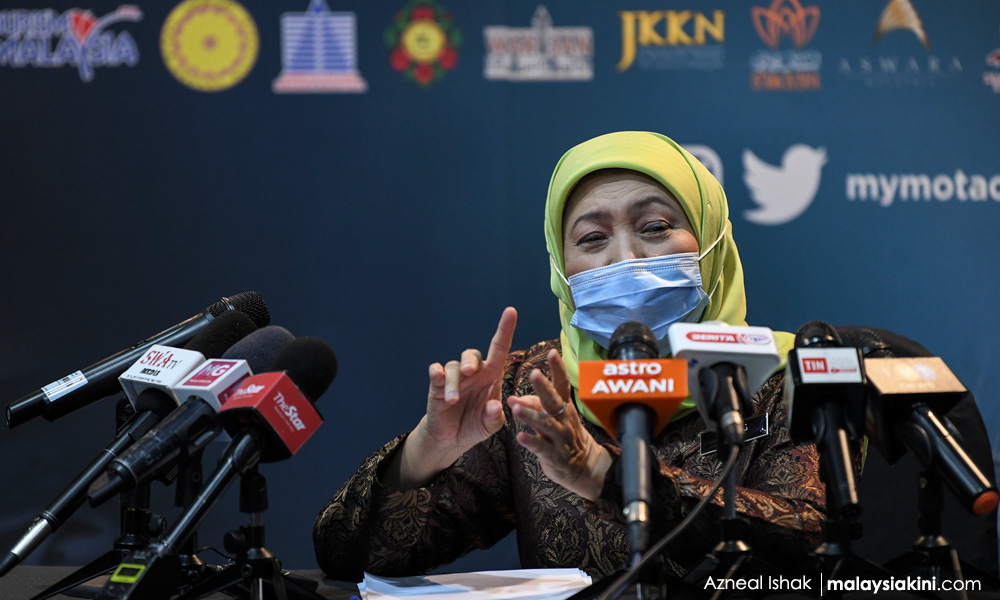The Ministry of Law is not really the Ministry of Law. Since 1974, the Ministry of Law has been collapsed into merely one portfolio under the Prime Minister’s Department.
You should not fault yourself for not knowing what a law minister does, because neither does a law minister sometimes. Without a defined portfolio, a law minister is a catch-all for everything related to law. The minister also does not carry the esteem other minister does, and they often suffer the curse of having a “de facto” in front of their title.
The late Liew Vui Keong held the de facto law minister during Pakatan Harapan’s administration, and Nancy Shukri made sure you did not address her even as a “de facto law minister” when she was under Najib Abdul Razak’s tenure. She was merely “a minister in the Prime Minister’s Department... [and] law in one of the portfolios.”
That is why it must be shocking for Takiyuddin Hassan to find out that he, as a minister in the Prime Minister’s Department (Law and Parliament), was given the awesome powers to revoke the emergency ordinances of our country.
Seated one row behind the prime minister, Takiyuddin took control of the chaotic Dewan Rakyat yesterday and said he has three important matters to set the course of the session.
“Please listen to me,” said Takiyuddin, as he reached the third item of emphasis. “The government has decided, based on Article 150(3) [of the Federal Constitution] to revoke emergency ordinances that were made under the declaration of emergency.”
As he finished, the government MPs, including the former de facto law minister Nancy Shukri behind him, thumped their tables to mimic a roaring cheer. “We have succeeded, we have succeeded,” an MP said as Takiyuddin proudly took his seat.

Little did he know, his final claim has inadvertently unleashed three admissions of the government’s abuse of power.
One, the legal fallacy. Legal experts have claimed that there are only two ways you could validly revoke this: Either the Agong revokes it and a gazette is published, or Parliament votes to annul. Since we know that the Parliament did not vote on this, the only option left is for the Agong to revoke it. But checks have indicated that there was no gazette published on the revocation.
That means, there are only three likely scenarios. Either the Agong has already revoked it but the gazette has yet to be published (unlikely), or Takiyuddin made a premature announcement that precedes and assumes the Agong’s intentions (likely), or that the revocation process is exactly what we saw - Takiyuddin’s words and nothing more (highly likely).
Only the first unlikely scenario is constitutional, and the latter two likely scenarios are obvious abuses of power.
The constitutional safeguard of Article 150(3) is designed precisely to address abuse of power of this nature. In fact, the Federal Court in Anwar Ibrahim v PP (2002) emphasised this by saying that the requirements of the Federal Constitution are strict, that passing through both Houses of Parliament is necessary, and failing either part would result in the emergency ordinance to survive.
A “pasar malam” manner of declaring and revoking important legislations of enormous consequence is not what the framers of the Federal Constitution had in mind.
Two, the policy fallacy. By “revoking” the emergency ordinances in less than 30 seconds, the government has also invited substantial practical difficulties of policy and law that flow from the emergency ordinances.
Bagan MP Lim Guan Eng asked a question on implications. He said, “If the emergency ordinances were revoked on July 21, 2021, does that mean that all the punishments and fines that were issued from that date are also cancelled automatically?”

After a few exchanges, Takiyuddin waved his hands and said in agreement, “Yes, that one can’t be used anymore, it won’t be continued (Ye lah tak boleh pakai lah, tak disambung lah). Already revoked, so the question of being in force for another six months does not arise.”
The practical implications are confusing. We are not sure if the enforcements based on the emergency ordinances from July 21 are valid, and if they are, what is the last date of validity? Furthermore, if the revocation is not effective but the government claims it was, then would laws of the emergency ordinances still be valid for the coming six months?
Not dealing with these practical questions simply because the government wants to avoid a parliamentary vote is another instance of abuse of power.
Three, the declaration fallacy. At its simplest, the eagerness of the government to “revoke” the emergency ordinances have accidentally shown that the first seven months of the declaration of emergency is baseless. It is simply an abuse of power.
The basis for Malaysia being one of the only three countries that declared a national emergency in 2021 (the other being Myanmar and Trinidad and Tobago) is the rising number of Covid-19 cases. Back then, the daily cases were 3,000, with a cumulative case count of 138,000.
Today, we are revoking the emergency ordinances and discontinuing the state of emergency even though the daily cases are five times higher, and the cumulative cases are higher by nine-folds.
This proves that the national emergency was truly an overkill and nothing more than a political tool to serve the government. It was useful to suspend Parliament initially to avoid a parliamentary vote, and suddenly when it was compelled a vote, they abandoned it as quickly. The basis was politics, not Covid-19.
When you have a government whose first instinct is to bend the rules than to respect them, abuse of power is a given. But what we did not expect is that the government would be caught in their own game so soon: the emergency turned from a blessing to a curse, and Takiyuddin turned from a minister in brackets to a king. - Mkini
JAMES CHAI is a legal consultant and researcher working for Invoke, among others. He also blogs at jameschai.com.my. You may reach him at jameschai.mpuk@gmail.com.
The views expressed here are those of the author/contributor and do not necessarily represent the views of MMKtT.




No comments:
Post a Comment
Note: Only a member of this blog may post a comment.